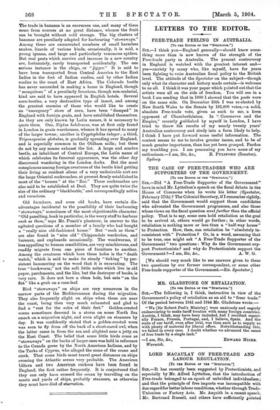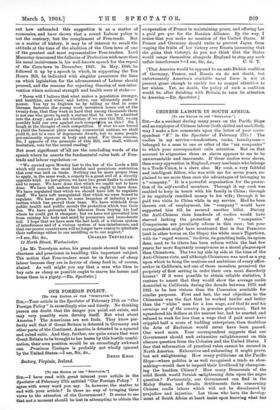LORD MACAULAY ON FREE-TRADE AND LABOUR REGULATION.
[To TEM EDITOR OF TEl 'SPECTATOR")
SIS,—It has recently been suggested by Protectionists, and especially by Mr. Alfred Lyttelton, that the introduction of Free-trade belonged to an epoch of unbridled individualism; and that the principle of free imports was incompatible with due regard for better labour conditions, whether through Trade- Unionism or Factory Acts. Mr. Asquith in a recent speech, Mr. Bertrand Russell, and others have sufficiently pointed out how unfounded this suggestion is as a matter of economics, and have shown that a sound Labour policy is not the contrary, but the complement of Free-trade. But as a matter of history, it may be of interest to recall the attitude at the time of the abolition of the Corn-laws of one of the greatest and most representative Free-traders. Lord Macaulay denounced the fallacies of Protection with more than his usual incisiveness in his well-known speech for the repeal of the Corn-laws in December, 1845. In May, 1846, he followed it up by a speech in which, in supporting the Ten Hours Bill, he indicated with singUlar prescience the lines on which legislation for the advancement of Labour should proceed, and the reasons for rejecting theories of non-inter- vention where national strength and health were at stake :—
"Never will I believe that what makes a population stronger, and healthier, and wiser, and better, can ultimately make it poorer. You try to frighten us by telling us that in some German factories the -young work seventeen hours out of the twenty-four, that they work so hard that among thousands there is not one who grows ti such a stature that he can be admitted into the Army ; and you ask whether, if we pass this Bill, we can possibly hold our own against such competition as this ? Sir, I laugh at the thought of such competition. If ever we are forced to yield the foremost place among commercial nations, we shall yield it, not to a race of degenerate dwarfs, but to some people pre-eminently vigorous in body and mind. For these reasons, Sir, I approve of the principle of this Bill, and shall, without hesitation, vote for the second reading."
But most significant orall are the concluding words of the speech where he asserts the fundamental value both of Free- trade and labour regulation :—
"We carried upon Monday last to the bar of the Lords a Bill which will remove the most hateful and pernicious restriction that ever was laid on trade. Nothing can be more proper than to apply, in the same week, a remedy to a great evil of a directly opposite kind. As law-givers, we have two great faults to confess and to repair. We have done that which we ought not to have done. We have left undone that which we ought to have done. We have regulated that which we should have left to regulate itself. We have left unregulated that which we were bound to regulate. We have given to some branches of industry a pro- tection which has proved their bane. We have withheld from public health and public morals the protection which was their due. We have prevented the labourer from buying his loaf where he could get it cheapest ; but we have not prevented him from ruining his body and mind by premature and immoderate toil. I hope that we have seen the last both of a vicious system of interference and of a vicious system of non-interference, and that our poorer countrymen will no longer have reason to attribute their sufferings either to our meddling or to our neglect."
11 North Street, Westminster.
[As Mr. Trevelyan notes, his great-uncle showed his usual clearness and prescience in handling this important subject. The notion that Free-traders must be in favour of cheap labour because they are in favour of cheap food is, of course, absurd. As well might you say that a man who likes to buy oats as cheap as possible ought to starve his horses and house them in a pigsty.—En. Spectator.]











































 Previous page
Previous page